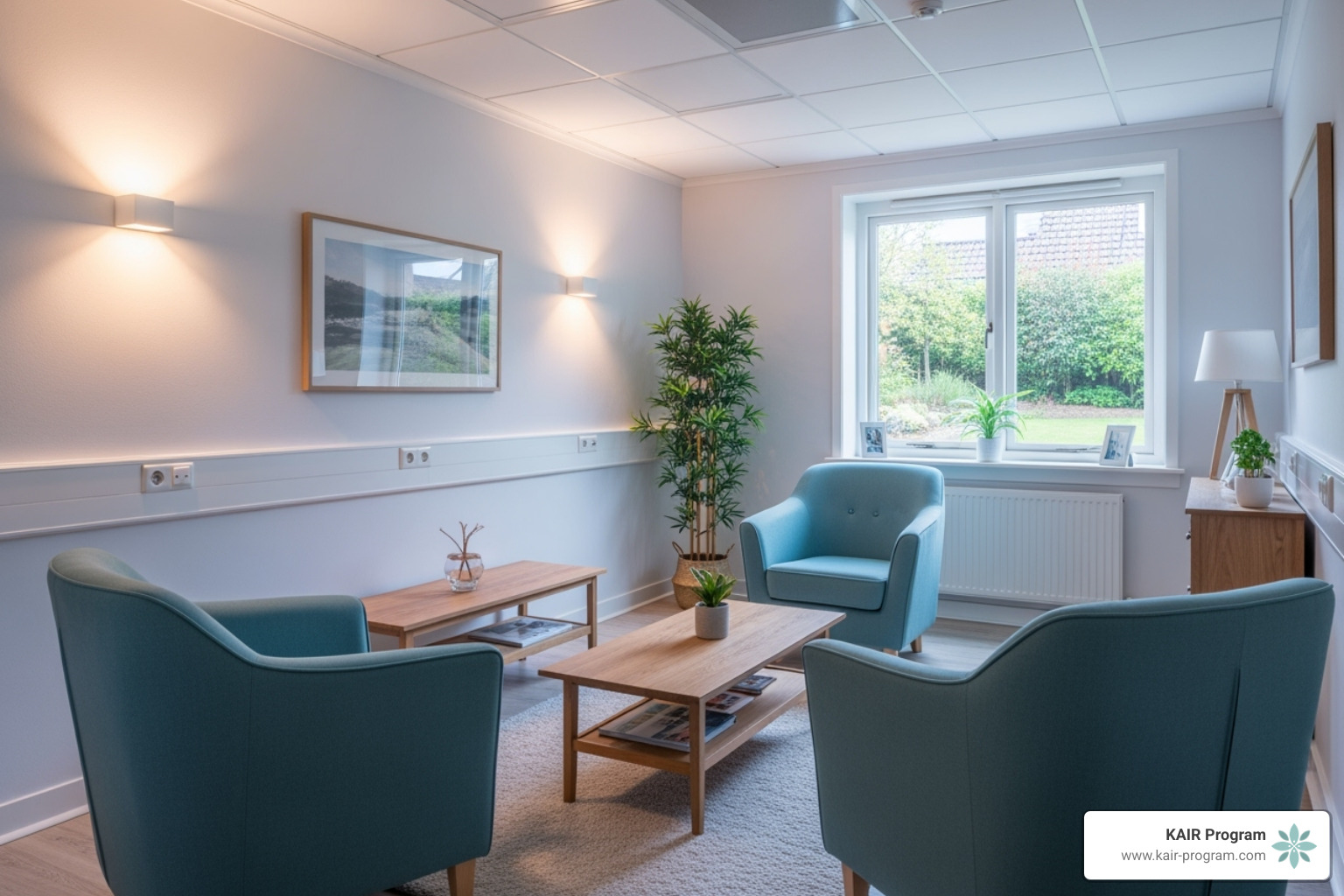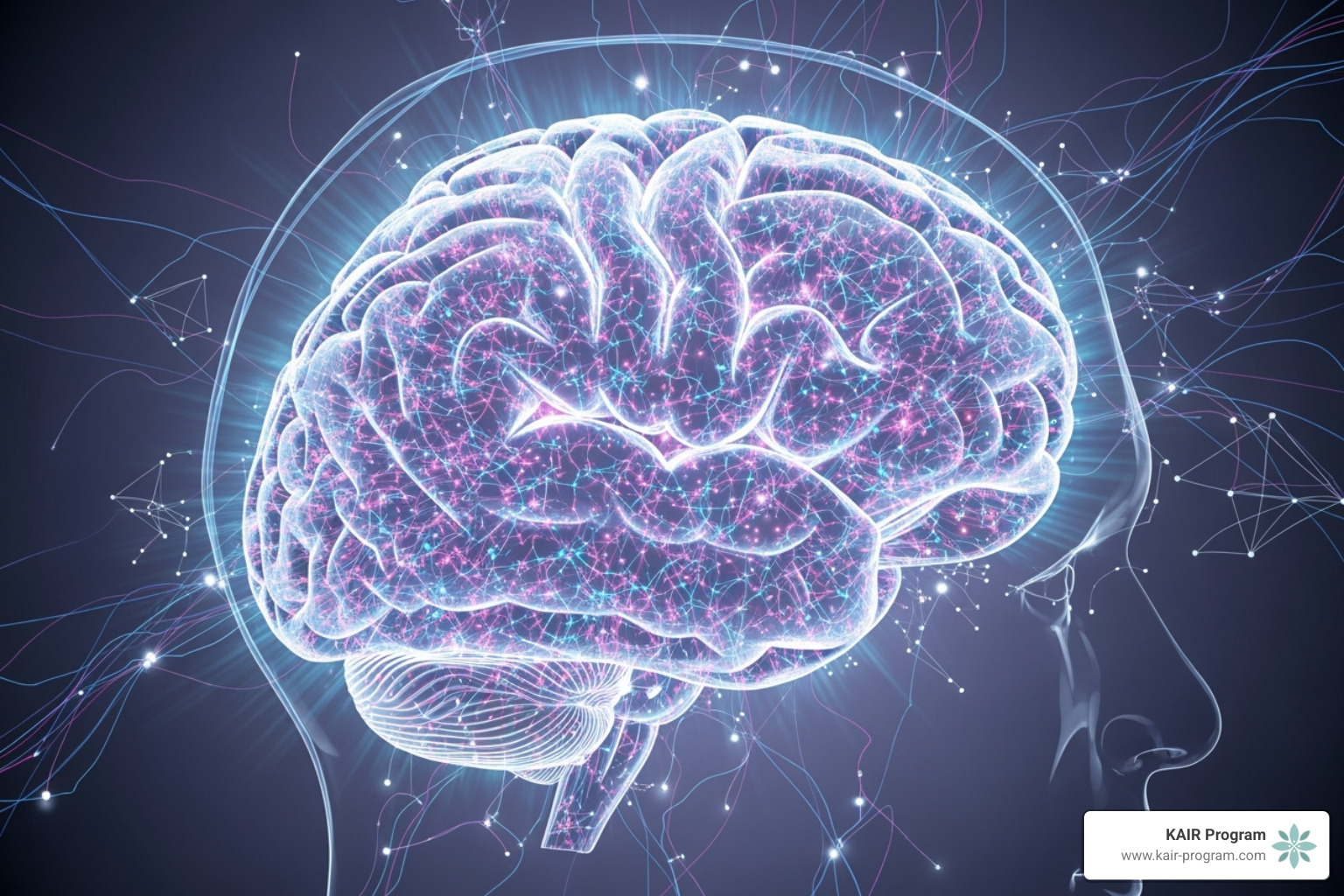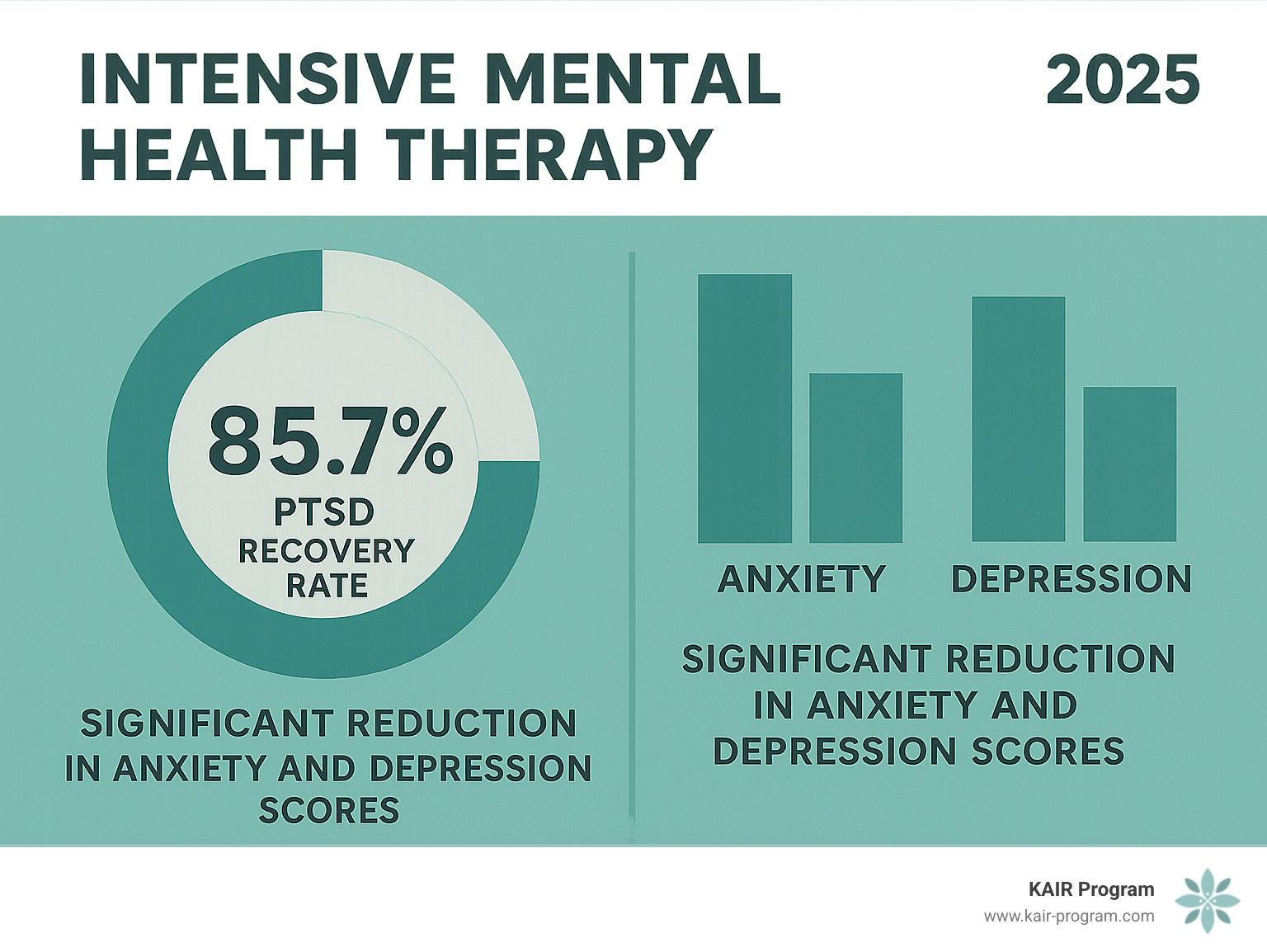Fast-Track Healing with Intensive Therapy for PTSD
Why Intensive Mental Health Therapy is Revolutionizing PTSD Treatment
What is Intensive Mental Health Therapy and How Does It Differ?
Picture this: instead of spending years in weekly therapy sessions, slowly chipping away at your trauma and mental health challenges, you could achieve profound healing in just weeks. That's the promise of intensive mental health therapy – a approach that's changing how we think about mental health treatment.
The difference between traditional and intensive therapy is like comparing a gentle stream to a powerful river. Traditional therapy gives you 50 minutes once a week to work on your issues. You spend the first few minutes catching your therapist up on what happened since your last session, then dive into the work, only to have it interrupted when your time is up.
Intensive mental health therapy flips this model completely. Instead of those brief weekly check-ins, you get extended, immersive sessions that allow you to go deeper and stay focused on your healing journey. There's no need to constantly restart or re-explain where you left off – you maintain momentum throughout the entire process.
Research backs up this approach beautifully. A 2012 study found that people in intensive therapy programs showed significant decreases in anxiety and depression scores, while their hope scores increased dramatically. When you're not constantly stopping and starting, real change can happen faster.
| Aspect | Traditional Therapy | Intensive Therapy |
|---|---|---|
| Frequency | 1x per week | 3-5x per week or daily |
| Session Length | 50 minutes | 3-8 hours |
| Total Duration | 12-20 weeks or longer | 2-12 weeks |
| Pace | Gradual, incremental | Accelerated, immersive |
| Best For | Maintenance, mild symptoms | Severe symptoms, breakthrough needed |
The beauty of this concentrated approach is that it eliminates the frustrating cycle of making progress, then losing momentum between sessions. Instead of taking baby steps, you can make giant leaps forward in your healing.
The Core Principles of Intensive Treatment
What makes intensive therapy so effective? It's built on some key principles that traditional therapy simply can't match.
First, there's the goal-driven approach. Every session builds directly on the last one, creating a clear path toward healing. You're not just talking about your problems week after week – you're actively working through them with sustained focus and energy.
The deep-dive sessions are where the magic happens. With hours instead of minutes, you can explore trauma and emotional patterns without feeling rushed. You can sit with difficult emotions, process them fully, and work through them in real-time with your therapist's guidance.
Perhaps most importantly, you get to practice new skills immediately and get feedback. If you learn a coping strategy in the morning, you can try it out during lunch and process how it went in the afternoon session. This creates a rapid feedback loop that accelerates your learning and growth.
The therapeutic relationship – that crucial bond between you and your therapist – develops much more quickly too. When you're spending days together working through your deepest challenges, trust and connection form naturally. This strong alliance is essential for effective trauma treatment and healing.
Think of it as condensing years of therapy into weeks, but in the most supportive and effective way possible. You're not rushing the process – you're creating the optimal conditions for profound change to occur.
Who Benefits Most from This Accelerated Approach?

Intensive mental health therapy isn't for everyone, but for certain people, it can be absolutely life-changing. If you're dealing with severe symptoms that are disrupting your daily life, this approach might be exactly what you need.
People with PTSD often find traditional therapy moves too slowly to address their urgent suffering. When you're dealing with flashbacks, hypervigilance, and emotional dysregulation, waiting a week between sessions can feel like an eternity. Trauma healing often requires the sustained attention that intensive programs provide.
If you've tried multiple therapists and approaches without success, you might be dealing with treatment-resistant depression. The concentrated nature of intensive therapy can help break through psychological barriers that have prevented progress in weekly sessions.
Chronic anxiety sufferers often benefit from the immersive approach because they can work through anxiety triggers in real-time and immediately practice new coping strategies. There's no waiting a week to discuss how a technique worked – you can adjust and refine your approach immediately.
Many professionals choose intensive therapy because they need to return to full function quickly. First responders, healthcare workers, and executives often can't take months off for traditional therapy, but they can manage a concentrated few weeks of intensive treatment.
Perhaps most importantly, if you feel "stuck" in traditional therapy after months or years of weekly sessions, intensive programs can provide the breakthrough you've been seeking. Sometimes you need that sustained therapeutic focus to identify and address the underlying issues that weren't accessible through traditional approaches.
The key is finding the right match between your needs and the intensity of treatment. When it's a good fit, the results can be truly transformative.
Exploring the Landscape of Intensive Therapy Programs

Finding the right intensive mental health therapy program can feel overwhelming, but understanding your options makes the journey clearer. Think of intensive programs as bridges - they connect you from where you are now to where you want to be, offering different levels of support based on your unique needs.
These programs work in two main ways. They can provide step-up care when traditional weekly therapy isn't enough, or step-down care when you're ready to transition from inpatient hospitalization back to everyday life. This flexibility makes intensive programs valuable stepping stones in your healing journey.
Choosing the right program depends on several key factors. Your symptom severity, current level of functioning, available support systems, work and family responsibilities, and previous treatment experiences all play important roles. A thorough assessment with qualified mental health professionals helps determine which level of care will serve you best.
Types of Intensive Therapy Programs
The world of intensive therapy offers several distinct pathways, each designed for different circumstances and needs.
Intensive Outpatient Programs (IOPs) represent the most flexible option. You'll typically spend 2-3 hours in therapy, 3-5 days per week, while continuing to live at home and maintain your daily responsibilities. IOPs work beautifully for people with strong support systems who need intensive treatment but can function safely in their regular environment.
Partial Hospitalization Programs (PHPs) step up the intensity significantly. You'll engage in about 5 hours of therapy daily for 5 days a week, then return home each evening. This level bridges the gap between outpatient and residential care, perfect for those who need more support than IOPs provide but don't require round-the-clock supervision.
Residential Treatment Programs offer the most comprehensive care available. You'll live in a therapeutic environment for typically a month or longer, receiving 24-hour support and intensive intervention. This level serves individuals with severe symptoms who need constant therapeutic presence and structured healing environment.
Mental Health Retreats provide a unique approach that combines intensive therapy with immersive, often nature-based settings. These programs typically last 3-7 days and focus on specific therapeutic approaches in concentrated formats, creating powerful breakthrough experiences.
The growth in intensive programs reflects their effectiveness. IOP facilities have increased by nearly 3,000 from 2010 through 2020, totaling 16,000 facilities nationwide. The number of people served by IOPs rose from 1.2 million per year in 2010 to 1.4 million per year in 2019, showing how many are finding healing through intensive approaches.
Typical Duration and Daily Structure
Each level of intensive care has its own rhythm and flow, designed to maximize healing while fitting your life circumstances.
IOP structure typically involves 3-4 hours of treatment per day for 3-5 days a week, with programs lasting about 4-6 weeks. Some specialized programs offer over 120 hours of psychotherapy and comprehensive treatment modalities packed into a four-week period - that's like getting months of traditional therapy in a concentrated timeframe.
PHP structure requires full-day participation, with 6-8 hours of therapeutic activities daily. These intensive day treatment programs usually run for 4-6 weeks, providing comprehensive support while allowing you to sleep in your own bed each night.
Residential structure offers the most immersive experience, with therapeutic activities woven throughout your day and evening. These programs typically last 30 days or longer, creating a complete therapeutic environment where healing becomes your primary focus.
A typical day in any intensive program might include individual therapy sessions, group therapy, skills training, experiential activities like art or music therapy, mindfulness practice, and psychoeducation. This variety ensures that different learning styles and therapeutic needs are addressed, keeping you engaged and making progress from multiple angles.
The Crucial Role of Family Involvement
Healing doesn't happen in isolation - it occurs within the web of our relationships. That's why family involvement forms such a crucial part of successful intensive therapy, especially for trauma-related conditions.
Family systems theory recognizes that individual healing affects and is affected by our closest relationships. Family members often need their own support and education to understand what you're experiencing and how they can best support your recovery journey.
Many intensive programs offer dedicated family therapy sessions that address relationship patterns that may contribute to mental health symptoms. These sessions help improve communication, educate family members about mental health conditions, and develop practical strategies for ongoing support.
Building a support network through family involvement creates a foundation for your transition back to daily life after intensive treatment. Research consistently shows that strong social support improves treatment outcomes and reduces the chance of setbacks across various mental health conditions.
The shared recovery journey often strengthens family bonds and creates new, healthier patterns of interaction that support long-term healing. Family members frequently report feeling more equipped to provide appropriate support and less helpless when facing their loved one's mental health challenges.
Educating loved ones about your condition and treatment helps them understand that healing is possible and that they play an important role in your recovery. This education reduces stigma within the family system and creates a more supportive environment for sustained wellness.
Inside an Intensive Program: Therapeutic Approaches and Activities
Intensive mental health therapy programs bring together teams of skilled therapists, psychiatrists, and wellness professionals who work together to create a comprehensive healing experience. Rather than focusing on just one aspect of mental health, these programs recognize that true healing happens when we address the whole person - mind, body, and spirit.
What makes intensive programs so effective is their personalized approach. Your treatment team takes time to understand your unique story, trauma history, and goals before creating a plan that's specifically designed for you. This isn't a one-size-fits-all approach - it's carefully crafted to address the specific factors that contribute to your mental health challenges.
The beauty of advanced trauma treatment lies in understanding that trauma doesn't just live in our thoughts - it affects our entire nervous system. That's why intensive programs use approaches that help heal both the psychological and physical impacts of trauma.
Foundational Therapeutic Modalities
Most intensive programs build their foundation on Cognitive Behavioral Therapy (CBT), which helps you recognize and change the thought patterns that keep you stuck. The intensive format makes CBT incredibly powerful - research on intensive CBT for PTSD shows that what typically takes 12-20 weeks of weekly sessions can be accomplished in just one week of intensive work.
Dialectical Behavior Therapy (DBT) provides practical skills that you can use immediately. You'll learn how to manage overwhelming emotions, tolerate distress without making things worse, communicate more effectively, and stay present in difficult moments. The intensive setting means you can practice these skills throughout the day with your therapist's support.
Mindfulness practices help you develop a different relationship with your thoughts and feelings. Instead of being overwhelmed by them, you learn to observe them with curiosity and compassion. In intensive programs, you have multiple opportunities each day to practice these skills in real-time.
Group therapy connects you with others who truly understand what you're going through. There's something powerful about sharing your story with people who "get it" - it reduces shame and helps you realize you're not alone. The intensive format creates deep bonds between group members and speeds up the healing process through shared experience.
Body-based therapies address the way trauma gets stored in your nervous system. You'll learn to notice physical sensations and understand what your body is trying to tell you. This awareness helps you regulate your nervous system and respond to triggers in healthier ways.
Advanced and Trauma-Focused Approaches for Deeper Healing

For deeper trauma work, intensive programs offer specialized approaches that target the specific ways trauma affects memory, emotions, and your sense of self. Eye Movement Desensitization and Reprocessing (EMDR) helps process traumatic memories so they lose their emotional charge. EMDR therapy intensives can accomplish in days what might take months in traditional weekly sessions.
Accelerated Resolution Therapy (ART) combines elements from different therapeutic approaches to rapidly process traumatic experiences. The intensive format allows you to work through traumatic events completely within concentrated time periods, rather than leaving sessions feeling incomplete or stirred up.
Internal Family Systems (IFS) therapy helps you understand and heal different parts of yourself that may have developed to protect you from trauma. The extended sessions give you time to explore these internal dynamics deeply and begin healing wounded parts of yourself.
Psychedelic-assisted psychotherapy represents one of the most promising advances in trauma treatment. Ketamine intensive therapy has shown remarkable results for treatment-resistant depression and PTSD. The intensive format allows for optimal integration of insights gained during these profound experiences.
The concentrated nature of intensive therapy creates ideal conditions for lasting change. Your brain's ability to form new neural pathways - called neuroplasticity - is improved by the sustained therapeutic work. This means the changes you make are more likely to stick compared to the stop-and-start nature of weekly sessions.
Key Benefits and How to Access a Program
The change that happens through intensive mental health therapy goes far deeper than simply feeling better. When you compress months or years of healing into a concentrated timeframe, something remarkable occurs - you don't just manage your symptoms, you actually heal the underlying wounds that created them.
The research tells an incredible story. In one groundbreaking study, 85.7% of patients no longer met criteria for PTSD after completing intensive treatment. Think about that for a moment - nearly nine out of ten people walked away fundamentally changed, not just temporarily improved.
What makes this even more powerful is how quickly these changes happen. Instead of spending years slowly chipping away at your trauma while juggling work, family, and other responsibilities, you can focus entirely on healing for a concentrated period. This means you get back to living your life sooner, with tools and insights that create lasting change.
The ripple effects extend far beyond the individual. When someone heals deeply and quickly, their relationships improve, their work performance increases, and their overall quality of life transforms. Intensive trauma therapy recognizes that trauma doesn't just affect your mind - it impacts every aspect of how you move through the world.
The Expected Outcomes of Intensive Mental Health Therapy
The most profound change people report is a deep understanding of themselves that emerges from sustained therapeutic focus. When you're not constantly starting over each week, you can dive into the patterns and beliefs that have been running your life from the shadows.
Many clients describe it as finally meeting themselves for the first time. The extended sessions create space for parts of your story that have never been fully explored or understood. You begin to see how your responses to life make perfect sense given what you've experienced.
Healing core wounds becomes possible when you can stay with difficult material long enough to process it completely. In traditional therapy, you might touch on a painful memory, then have to wait a week before returning to it. By then, you've often built your walls back up. Intensive therapy allows you to work through these experiences while you're still open and connected to them.
People often find a restored sense of safety in their own bodies and relationships. Trauma teaches us that the world is dangerous and that we can't trust our own responses. Through intensive work, you learn to recognize what actual safety feels like and how to create it in your daily life.
Post-traumatic growth - the positive changes that can emerge from working through trauma - happens more naturally when healing is concentrated. You develop new perspectives, deeper connections with others, and a genuine appreciation for life that goes far beyond just not feeling bad anymore.
The 85.7% recovery rate isn't just a statistic - it represents real people who went from feeling hopeless to rebuilding meaningful lives. The intensive format helps these changes stick because you've had time to practice new ways of being with immediate support and feedback.

How to Find and Choose the Right Intensive Mental Health Therapy Program
Starting your search for the right intensive program can feel overwhelming, but breaking it down into steps makes it manageable. Begin with a consultation with a qualified mental health professional who understands intensive approaches. They can help you determine if you're ready for intensive work and what level of care would be most beneficial.
Insurance coverage varies dramatically for intensive programs. Many traditional insurance plans cover some intensive outpatient programs, but specialized approaches or residential programs may not be covered. Don't let this discourage you - many programs offer payment plans or sliding scale fees. Sometimes the investment in intensive treatment costs less than years of traditional therapy.
Online research can help you identify programs that match your specific needs. The SAMHSA National Helpline and Treatment Locator provides comprehensive information about mental health services nationwide and can help you find intensive programs in your area.
When you're evaluating programs, ask direct questions about staff credentials and specialized training. You want therapists who have specific experience with intensive approaches, not just traditional therapy delivered more frequently. Ask about their success rates and outcome data - reputable programs track their results and can share them with you.
Program structure matters enormously. Some people thrive in group settings, while others need individual focus. Some benefit from residential programs, while others do better returning home each evening. Understanding the daily structure and therapeutic modalities helps you choose a program that fits your learning style and needs.
Vetting program credentials protects you from programs that promise more than they can deliver. Look for appropriate licensing, accreditation, and staff with specialized training in trauma-focused intensive approaches. Don't hesitate to ask for references or to speak with program graduates.
For those drawn to healing environments that combine intensive therapy with supportive settings, understanding why choose a retreat format can help you determine if an immersive experience would support your healing journey.
The right intensive program doesn't just treat your symptoms - it provides a transformative experience that changes how you relate to yourself and the world around you. Taking the time to find the right fit increases your chances of achieving the profound healing that intensive mental health therapy can provide.
Conclusion
Intensive mental health therapy represents a powerful paradigm shift in how we approach healing from trauma and severe mental health conditions. For too many people, traditional weekly therapy sessions feel like trying to fill a bucket with a hole in the bottom - progress is slow, and setbacks can feel devastating.
The concentrated, immersive nature of intensive programs offers genuine hope for those who have struggled with traditional approaches or need rapid intervention to restore functioning and well-being. This isn't about taking shortcuts - it's about creating the optimal conditions for your brain and nervous system to heal.
The research speaks volumes about what's possible. With 85.7% recovery rates from PTSD and significant improvements in depression and anxiety scores, intensive approaches offer more than hope - they offer proven results. When you're suffering, weeks matter more than months or years.
For individuals struggling with PTSD, treatment-resistant depression, complex trauma, or other severe mental health conditions, intensive mental health therapy provides a path to accelerated healing that honors both the urgency of suffering and the possibility of profound change. You don't have to accept that healing takes forever.
At KAIR Program, we've witnessed the transformative power of intensive approaches through our specialized ketamine-assisted retreats. We combine cutting-edge psychedelic medicine with expert-led trauma-focused therapy in an intensive format that creates optimal conditions for rapid, lasting healing.
Our approach is particularly effective for those who haven't found relief through traditional treatment approaches. Sometimes your breakthrough is waiting on the other side of a different kind of intervention - one that matches the intensity of your commitment to healing.
The journey toward mental health doesn't have to be a long, slow climb filled with weekly check-ins and incremental progress. Sometimes the most effective path is the intensive one - a concentrated period of focused healing that can open up the door to lasting wellness and renewed hope.
Your suffering has been intense. Your healing can be too.
If you're ready to explore how intensive therapy might accelerate your healing journey, we invite you to learn more about our specialized PTSD treatment programs. Your breakthrough might be closer than you think.
